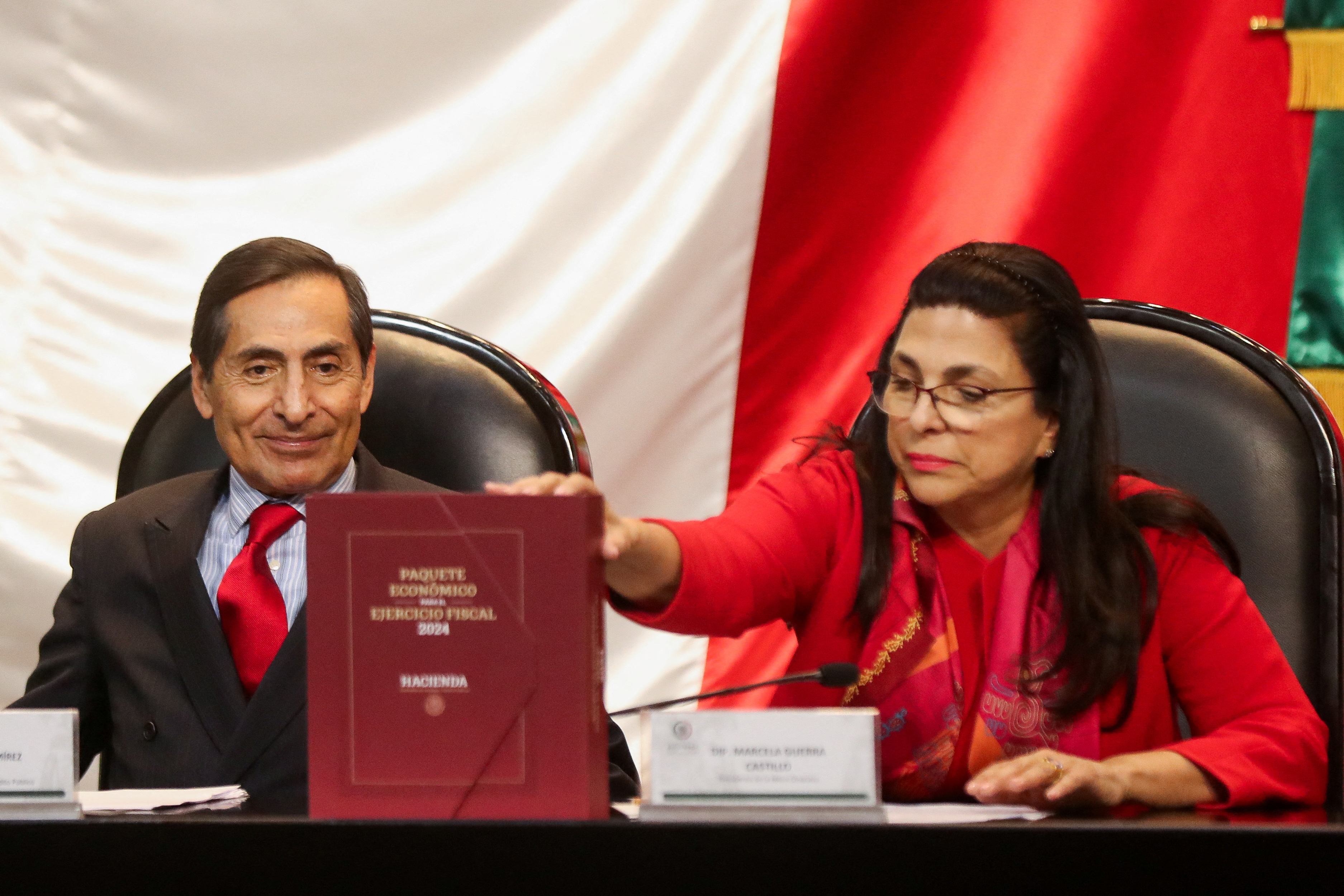
Mexico’s Finance Ministry Rogelio Ramirez de la O and President of the Mexican Chamber of Deputies Directive Board Marcela Guerra present the 2024 national budget to the Congress, at the Congress building in Mexico City, Mexico September 8, 2023. REUTERS/Raquel Cunha Acquire Licensing Rights
MEXICO CITY, Sept 11 (Reuters) – The Mexican government’s plan to run up the biggest budget deficit in decades during the 2024 general election year could put pressure on public finances and eventually threaten its credit rating, analysts said on Monday.
In its budget plan, the government on Friday forecast the deficit would widen from 3.3% of gross domestic product (GDP) this year to 4.9% next year as the country gears up to elect a successor to President Andres Manuel Lopez Obrador.
Much of the added spending will cover bigger outlays on social programs and funding for Lopez Obrador’s flagship infrastructure projects, in particular the so-called Mayan Train, a major new railway in southeastern Mexico.
He has so far kept spending in check by slimming down parts of the state he sees as superfluous and curbing public sector pay, but is loosening restrictions heading into the election.
“It’s a very electoral budget,” said Patricia Terrazas, a member of the opposition center-right National Action Party (PAN) who sits on the lower house of Congress finance committee.
Lopez Obrador last week backed former Mexico City Mayor Claudia Sheinbaum as his party’s candidate to succeed him. Mexican presidents can only serve a single six-year term.
Historic data show the projected budget deficit for 2024 will be the highest since 1988 as a proportion of GDP.
Mexico’s 10-year bond yield rose 17 basis points on Monday, reflecting what analyst Gabriela Siller of Banco Base said were expectations about the prospect of higher borrowing.
Still, the peso currency strengthened over 1.5% against the dollar, leading a rise in Latin American currencies.
With the central bank’s benchmark interest rate at 11.25%, Mexico’s government is already having to pay more to issue debt, and the yield on its May 2031 10-year bond has risen 100 basis points since July 21, according LSEG Eikon data.
The Bank of Mexico took rates to historic highs to combat soaring price pressures and has signaled it will keep them elevated for an extended period, pressuring growth. Inflation is now below 5%, but remains well above the bank’s 3% target.
The government’s higher spending plans should bolster Latin America’s second-biggest economy, which has outpaced forecasts this year, brightening the outlook for 2024.
However, it could also slow down the process of getting inflation under control, and thus keep rates higher for longer, said Alberto Ramos, an economist at Goldman Sachs.
“From this expansionary baseline, fiscal slippages (which would lead to a budget deficit of around 6% of GDP) could trigger sovereign rating downgrades, in particular if growth decelerates visibly,” Ramos said in a research note.
Some other economists were reasonably upbeat.
Raul Feliz, an economist at the CIDE think tank in Mexico City, said because Mexico had – in contrast to many governments – kept spending down during the COVID-19 pandemic, it now had some fiscal room to maneuver during the election year.
“It’s not that worrying, quite frankly,” he said.
He also noted that since Mexico’s current account deficit is currently considerably lower than foreign direct investment, there was a pool of untapped demand in the economy that the government could temporarily offset via higher spending.
But it would have to get spending under control sooner or later, and most likely need to enact fiscal reform in the next government to do so sustainably, Feliz said.
Reporting by Dave Graham and Diego Ore; Additional reporting by Noe Torres; Editing by Jamie Freed
Our Standards: The Thomson Reuters Trust Principles.